See also
- White and Company, an Illinois manufacturer of stoneware and tile which is connected to two archaeological sites:
The White Company was a 14th-century English mercenary company which operated in Italy.
White Company may also refer to:
Harvey, Harveys or Harvey's may refer to:

Berne is a city within Monroe and Wabash townships, Adams County, Indiana, United States, located 35 miles (56 km) south of Fort Wayne. The population was 4,173 at the 2020 Census. Berne is widely known for its Swiss heritage, architecture and culture, and for its status as the "Furniture Capital of Indiana." In 2021, Berne was rated the "Safest Small City in Indiana." Bloomberg Businessweek rated Berne the 2nd "Best Place to Raise Your Kids" in Indiana in 2011.

Greensboro is a borough in Greene County, Pennsylvania, United States. The population was 267 at the 2020 census, up from 260 at the 2010 census.
Federal or foederal (archaic) may refer to:

Tonawanda is a city in Erie County, New York, United States. The population was 15,129 at the 2020 census. It is at the northern edge of Erie County, south across the Erie Canal from North Tonawanda, east of Grand Island, and north of Buffalo. It is part of the Buffalo-Niagara Falls metropolitan area.

Stoneware is a broad term for pottery fired at a relatively high temperature. A modern definition is a vitreous or semi-vitreous ceramic made primarily from stoneware clay or non-refractory fire clay. End applications include tableware, decorative ware such as vases.
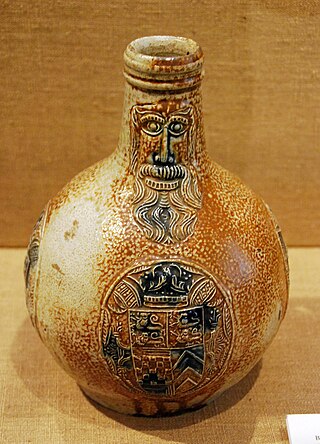
Salt-glaze or salt glaze pottery is pottery, usually stoneware, with a glaze of glossy, translucent and slightly orange-peel-like texture which was formed by throwing common salt into the kiln during the higher temperature part of the firing process. Sodium from the salt reacts with silica in the clay body to form a glassy coating of sodium silicate. The glaze may be colourless or may be coloured various shades of brown, blue, or purple.
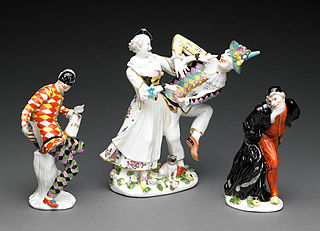
Meissen porcelain or Meissen china was the first European hard-paste porcelain. Early experiments were done in 1708 by Ehrenfried Walther von Tschirnhaus. After his death that October, Johann Friedrich Böttger continued von Tschirnhaus's work and brought this type of porcelain to the market, financed by Augustus the Strong, King of Poland and Elector of Saxony. The production of porcelain in the royal factory at Meissen, near Dresden, started in 1710 and attracted artists and artisans to establish, arguably, the most famous porcelain manufacturer known throughout the world. Its signature logo, the crossed swords, was introduced in 1720 to protect its production; the mark of the swords is reportedly one of the oldest trademarks in existence.
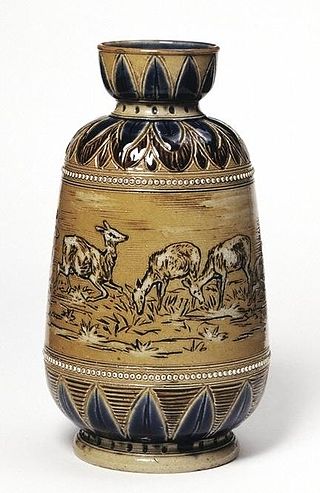
Royal Doulton is an English ceramic and home accessories manufacturer that was founded in 1815. Operating originally in Vauxhall, London, and later moving to Lambeth, in 1882 it opened a factory in Burslem, Stoke-on-Trent, in the centre of English pottery. From the start, the backbone of the business was a wide range of utilitarian wares, mostly stonewares, including storage jars, tankards and the like, and later extending to drain pipes, lavatories, water filters, electrical porcelain and other technical ceramics. From 1853 to 1901, its wares were marked Doulton & Co., then from 1901, when a royal warrant was given, Royal Doulton.

Villeroy & Boch is a German manufacturer of ceramics, with the company headquarters located in Mettlach, Saarland.

The Roseville Pottery Company was an American art pottery manufacturer in the 19th and 20th centuries. Along with Rookwood Pottery and Weller Pottery, it was one of the three major art potteries located in Ohio around the turn of the 20th century. Though the company originally made simple household pieces, the Arts and Crafts–inspired designs proved popular, and Roseville pieces are now sought after by collectors.

Goose Lake Prairie State Natural Area is a 2,537-acre (1,027 ha) state park and listed state nature preserve. More than half of the state park is a tallgrass prairie maintained as a natural area of Illinois. It is located in Grundy County near the town of Morris approximately 50 miles (80 km) southwest of Chicago.

Ashley Furniture Industries, Inc. is an American home furnishings manufacturer and retailer, headquartered in Arcadia, Wisconsin. The company is owned by father and son team Ron and Todd Wanek. Ashley Furniture manufactures and distributes home furniture products throughout the world.
Vitra can refer to:
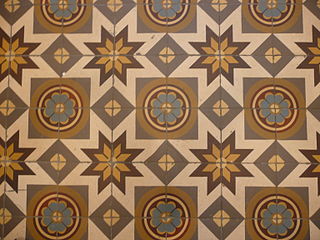
Cement tiles or hydraulic tiles are handmade colourful tiles used as floor and wall tiling. They appeared in Catalonia (Spain) in the 1850s, and have been widely used in Europe and America. Another origin is from Viviers, in the south of France, location of the famous ciment factory Lafarge. They represented a revolution in flooring in their day because they were much cheaper, more durable and easier to make than the previous handmade glazed ceramic tiles and were therefore more universally available for houses, and they allowed for profuse decorative patterns, their age of splendour being the end of the 19th to the middle of the 20th centuries, before they were gradually superseded by newer technologies as of the 1960s, such as terrazzo, salt-glazed stoneware, etc. that did not allow for such decorative embellishment but were cheaper.

White and Company's Goose Lake Stoneware Manufactury is an archaeological site located at 5010 N. Jugtown Road in the Goose Lake Prairie State Natural Area, near Morris, Illinois. The site, as well as the nearby tile works site, was part of a large White and Company plant used to manufacture stoneware and tile. The manufactury, which operated from 1855 to 1866, was one of the earliest large-scale stoneware plants in Illinois. The company chose the site for its plant due to the abundant clay resources around Goose Lake, which it used in its products. A town known as Jugtown was settled nearby for the plant's employees; the town reached a population of 114 by 1860. The stoneware site now mainly contains waste products from the stoneware production process, including kiln furniture and waster sherds.

White and Company's Goose Lake Tile Works is an archaeological site located at 5010 N. Jugtown Rd. in the Goose Lake Prairie State Natural Area, near Morris, Illinois. The site, as well as the nearby stoneware manufactury site, was part of a large White and Company plant used to manufacture stoneware and tile. The tile works, which operated from 1855 until 1865, was one of the earliest attempts at large-scale drainage tile production in Illinois. White and Company chose the site due to the abundance of clay around Goose Lake, which it used in its products. Due to the large number of workers employed by the company, a town called Jugtown was settled nearby; the town reached a population of 114 by 1860. The tile works site now mainly consists of waste products from tile production, including tile fragments and kiln furniture.

Ceramic art is art made from ceramic materials, including clay. It may take varied forms, including artistic pottery, including tableware, tiles, figurines and other sculpture. As one of the plastic arts, ceramic art is a visual art. While some ceramics are considered fine art, such as pottery or sculpture, most are considered to be decorative, industrial or applied art objects. Ceramic art can be created by one person or by a group, in a pottery or a ceramic factory with a group designing and manufacturing the artware.
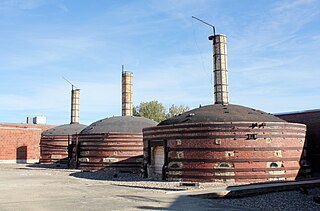
The Medalta Potteries was a Canadian ceramics manufacturing company in Medicine Hat, Alberta, that operated from 1916 to 1954. It was the first manufacturer in Western Canada to ship its products east of Ontario.
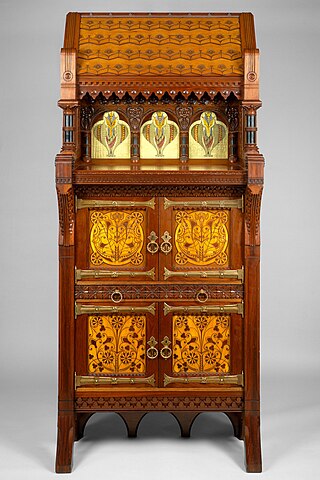
Modern Gothic exhibition cabinet is a piece of Modern Gothic furniture now in the collection of the Metropolitan Museum of Art. Although its design was once attributed to Philadelphia architect Frank Furness and furniture maker Daniel Pabst, MMA now credits its design and manufacture to Pabst alone. At 8 feet (2.4 m) tall, it is an unusually large and polychromatic American example of the rare style.